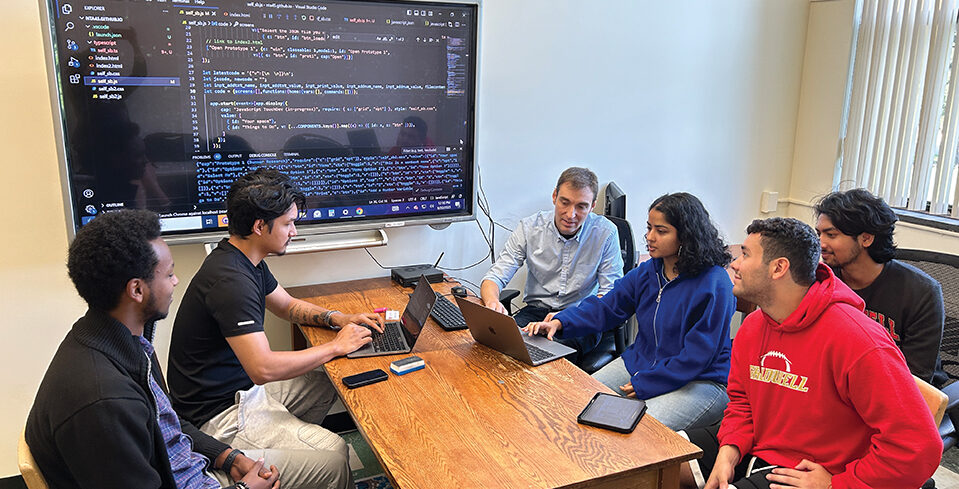Caldwell University
December 14, 2023
EXPANDING ARTIFICIAL INTELLIGENCE RESEARCH AND INTERDISCIPLINARY STUDIES

To see students go from “zero to understanding … to solve the logic puzzle” and get excited about computer science is like magic, says Vlad Veksler, who teaches computer science courses to majors and non-majors at Caldwell University. “We have many brilliant students,” says Veksler, assistant professor in the School of Business and Computer Science.
He gives examples of two students who presented their research at the 16th International Conference on Brain Informatics in August at Stevens Institute of Technology and another student who won a competition at DataFest at Vassar last semester. “There have been some really good success stories … they are expanding their résumés, applying for grad schools and internships,” says Veksler.
Veksler’s research and teaching focus on artificial intelligence and on human computer interaction, with a major emphasis on how humans interact with technology and computers and how to design software to make it easier for humans to learn and to use. He is excited to share that passion with students in the classroom and in the new computational research laboratory, CogAI. “We are working on bettering AI by making it more like human intelligence and by making it more accessible to humans as users of AI and technology,” says Veksler.

There is a growing demand in the field and in the Caldwell academic program, and Veksler and his colleagues in the School of Business and Computer Science are responding by modernizing the computer science curriculum and by adding new minors in human computer interaction and data analytics. “The marketplace is very technology-driven. Even jobs that didn’t used to be technology jobs are now technology jobs,” says Veksler.
Research in computer science helps students advance in their careers and adds “to the body of knowledge that we as humans have,” says Veksler. He ticks off a number of AI’s benefits, such as how the technology could save lives—“just being able to recognize that there is a child that ran in the middle of the road and [being able to] stop the car. That is huge.” Or reducing minor annoyances by automatically stationing elevators at different floors or automatically changing traffic light signal patterns based on heavy-volume times and locations. AI will expedite routine tasks, “which frees up humans to do human things,” contends Veksler, who has also been working with professors in other academic fields to expand Caldwell’s vision in computer science.
The CogAI lab, housed in the back of the Jennings Library, will be a part of the new Interdisciplinary Center for Quantitative Research where students from across academic fields will work on collaborative research involving computation and artificial intelligence. The human computer interaction minor combines computer science, psychology and design courses, and the curriculum focuses on areas such as user interface, user experience (UI/UX) and human-centered design. There are many great jobs in that niche, which focuses on adding software features that are usable, frustration-free and aesthetically pleasing, says Veksler. “There is no big app that you use, not a single one, that does not have UI/UX experts working on it.” The minor will include studies on responsible technology, cognitive psychology, digital art or design theory, data analysis and graphical user interface development/design.
Veksler’s interest in computer science began when he was a child after he and his family arrived in the U.S. from Ukraine in 1989. “What I was interested in was video games, but who has the money for those? You are not just buying all the video games that the kids want when you are an immigrant family.” But he had a little computer that was similar to a graphic calculator, and his mother was a programmer. She created a “guess a number game,” and her son was enamored by it. “At the age of 14, I was writing code on the little thing … I just kept going, and I knew I was going to be doing computer science work.”
In college he double majored in psychology and computer science at Rutgers, and he earned his Ph.D. at the renowned technological research university Rensselaer Polytechnic Institute. He worked in industry including at Telcordia (Bellcore), in government and academia and was self-employed. Today he is excited to bring that knowledge to students at Caldwell at a time when AI is rapidly advancing and jobs are plentiful for students graduating with a computer science degree.
This academic year Veksler is encouraging more students to engage in research. “They are going to participate in conferences and contribute to the human body of knowledge and science too at a fairly young age.” He is happy to be doing all this at Caldwell where he can expand his forward-thinking ideas and knowledge in machine learning while working in a community that values the human experience. “It’s noticeable how everybody [at Caldwell] knows each other. That’s not everywhere. It’s not just me saying it. It’s very personable, not like an industrial complex. And the students appreciate it.”





